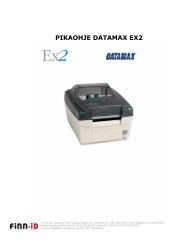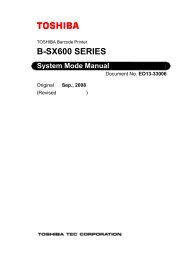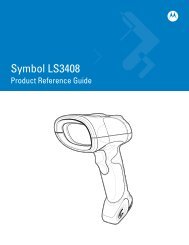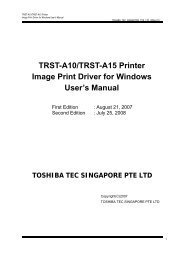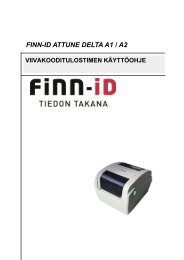- Page 2 and 3:
INfinity 510 Protocol Reference Gui
- Page 4 and 5:
Conventions used in this manual The
- Page 6 and 7:
Contents Tag Operations............
- Page 8 and 9:
Chapter 1 - Introduction TYPES OF I
- Page 10 and 11:
Chapter 2 - User Interface Overview
- Page 12 and 13:
Chapter 2 - User Interface Overview
- Page 14 and 15:
Chapter 3 - Command Overview COMMAN
- Page 16 and 17:
Chapter 3 - Command Overview DATA T
- Page 18 and 19:
Chapter 3 - Command Overview unauth
- Page 20 and 21:
Chapter 4 - Reader Behavior Creatin
- Page 22 and 23:
Chapter 4 - Reader Behavior READER
- Page 24 and 25:
Chapter 4 - Reader Behavior Protoco
- Page 26 and 27:
Chapter 4 - Reader Behavior Specify
- Page 28 and 29:
Chapter 4 - Reader Behavior Reading
- Page 30 and 31:
Chapter 4 - Reader Behavior The fol
- Page 32 and 33:
Chapter 4 - Reader Behavior Write T
- Page 34 and 35:
Chapter 4 - Reader Behavior Lock an
- Page 36 and 37:
Chapter 4 - Reader Behavior The fol
- Page 38 and 39:
Chapter 4 - Reader Behavior Tag Dat
- Page 40 and 41:
Chapter 4 - Reader Behavior A tag i
- Page 42 and 43:
Chapter 5 - Embedded Reader Applica
- Page 44 and 45:
Chapter 5 - Embedded Reader Applica
- Page 46 and 47:
Chapter 5 - Embedded Reader Applica
- Page 48 and 49:
Chapter 6 - Tag Protocol Support Ph
- Page 50 and 51:
Chapter 7 - Reader Namespace READER
- Page 52 and 53:
Chapter 7 - Reader Namespace reader
- Page 54 and 55:
Chapter 7 - Reader Namespace reader
- Page 56 and 57:
Chapter 7 - Reader Namespace reader
- Page 58 and 59:
Chapter 7 - Reader Namespace reader
- Page 60 and 61:
Chapter 7 - Reader Namespace reader
- Page 62 and 63:
Chapter 7 - Reader Namespace The fo
- Page 64 and 65:
Chapter 7 - Reader Namespace reader
- Page 66 and 67:
Chapter 7 - Reader Namespace reader
- Page 68 and 69:
Chapter 7 - Reader Namespace reader
- Page 70 and 71:
Chapter 7 - Reader Namespace reader
- Page 72 and 73:
Chapter 8 - Setup Namespace SETUP N
- Page 74 and 75:
Chapter 8 - Setup Namespace setup.p
- Page 76 and 77:
Chapter 8 - Setup Namespace setup.s
- Page 78 and 79:
Chapter 8 - Setup Namespace setup.v
- Page 80 and 81:
Chapter 9 - Info Namespace INFO NAM
- Page 82 and 83:
Chapter 9 - Info Namespace info.loc
- Page 84 and 85: Chapter 9 - Info Namespace info.ser
- Page 86 and 87: Chapter 9 - Info Namespace info.tim
- Page 88 and 89: Chapter 10 - Version Namespace vers
- Page 90 and 91: Chapter 11 - Com Namespace COM NAME
- Page 92 and 93: Chapter 11 - Com Namespace com.even
- Page 94 and 95: Chapter 11 - Com Namespace com.netw
- Page 96 and 97: Chapter 11 - Com Namespace com.netw
- Page 98 and 99: Chapter 11 - Com Namespace com.netw
- Page 100 and 101: Chapter 11 - Com Namespace com.netw
- Page 102 and 103: Chapter 11 - Com Namespace com.netw
- Page 104 and 105: Chapter 11 - Com Namespace com.netw
- Page 106 and 107: Chapter 11 - Com Namespace com.seri
- Page 108 and 109: Chapter 11 - Com Namespace com.seri
- Page 110 and 111: Chapter 11 - Com Namespace com.seri
- Page 112 and 113: Chapter 12 - Tag Namespace Tag Comm
- Page 114 and 115: Chapter 12 - Tag Namespace tag.lock
- Page 116 and 117: Chapter 12 - Tag Namespace tag.lock
- Page 118 and 119: Chapter 12 - Tag Namespace tag.lock
- Page 120 and 121: Chapter 12 - Tag Namespace tag.read
- Page 122 and 123: Chapter 12 - Tag Namespace tag.read
- Page 124 and 125: Chapter 12 - Tag Namespace tag.read
- Page 126 and 127: Chapter 12 - Tag Namespace tag.writ
- Page 128 and 129: Chapter 12 - Tag Namespace tag.writ
- Page 130 and 131: Chapter 12 - Tag Namespace tag.writ
- Page 132 and 133: Chapter 12 - Tag Namespace tag.writ
- Page 136 and 137: Chapter 12 - Tag Namespace tag.db.s
- Page 138 and 139: Chapter 12 - Tag Namespace tag.filt
- Page 140 and 141: Chapter 12 - Tag Namespace tag.filt
- Page 142 and 143: Chapter 12 - Tag Namespace tag.repo
- Page 144 and 145: Chapter 12 - Tag Namespace tag.repo
- Page 146 and 147: Chapter 12 - Tag Namespace tag.repo
- Page 148 and 149: Chapter 12 - Tag Namespace tag.repo
- Page 150 and 151: Chapter 12 - Tag Namespace tag.repo
- Page 152 and 153: Chapter 13 - DIO Namespace dio.in.
- Page 154 and 155: Chapter 13 - DIO Namespace dio.out.
- Page 156 and 157: Chapter 14 - Antennas Namespace ant
- Page 158 and 159: Chapter 14 - Antennas Namespace ant
- Page 160 and 161: Chapter 14 - Antennas Namespace ant
- Page 162 and 163: Chapter 14 - Antennas Namespace ant
- Page 164 and 165: Chapter 14 - Antennas Namespace ant
- Page 166 and 167: Chapter 15 - Modem Namespace Modem
- Page 168 and 169: Chapter 15 - Modem Namespace Modem
- Page 170 and 171: Chapter 15 - Modem Namespace modem.
- Page 172 and 173: Chapter 15 - Modem Namespace modem.
- Page 174 and 175: Chapter 15 - Modem Namespace modem.
- Page 176 and 177: Chapter 15 - Modem Namespace modem.
- Page 178 and 179: Chapter 15 - Modem Namespace modem.
- Page 180 and 181: Chapter 15 - Modem Namespace The fo
- Page 182 and 183: Chapter 15 - Modem Namespace modem.
- Page 184 and 185:
Chapter 15 - Modem Namespace modem.
- Page 186 and 187:
Chapter 15 - Modem Namespace >>> mo
- Page 188 and 189:
Chapter 15 - Modem Namespace modem.
- Page 190 and 191:
Chapter 15 - Modem Namespace modem.
- Page 192 and 193:
Chapter 15 - Modem Namespace modem.
- Page 194 and 195:
Chapter 15 - Modem Namespace modem.
- Page 196 and 197:
Chapter 15 - Modem Namespace modem.
- Page 198 and 199:
Chapter 15 - Modem Namespace modem.
- Page 200 and 201:
Chapter 15 - Modem Namespace modem.
- Page 202 and 203:
Chapter 15 - Modem Namespace modem.
- Page 204 and 205:
Chapter 15 - Modem Namespace modem.
- Page 206 and 207:
Chapter 15 - Modem Namespace modem.
- Page 208 and 209:
Chapter 15 - Modem Namespace modem.
- Page 210 and 211:
Chapter 15 - Modem Namespace modem.
- Page 212 and 213:
Chapter 15 - Modem Namespace modem.
- Page 214 and 215:
Chapter 15 - Modem Namespace modem.
- Page 216 and 217:
Chapter 15 - Modem Namespace modem.
- Page 218 and 219:
Chapter 17 - Errors Namespace ERROR
- Page 220 and 221:
Chapter 17 - Errors Namespace error
- Page 222 and 223:
Chapter 17 - Errors Namespace error
- Page 224 and 225:
Chapter 17 - Errors Namespace error
- Page 226 and 227:
Chapter 17 - Errors Namespace error
- Page 228 and 229:
Chapter 17 - Errors Namespace error
- Page 230 and 231:
Chapter 17 - Errors Namespace error
- Page 232 and 233:
Chapter 18 - Events Namespace Event
- Page 234 and 235:
Chapter 18 - Events Namespace event
- Page 236 and 237:
Chapter 18 - Events Namespace event
- Page 238 and 239:
Chapter 18 - Events Namespace event
- Page 240 and 241:
Chapter 18 - Events Namespace event
- Page 242 and 243:
Chapter 18 - Events Namespace event
- Page 244 and 245:
Chapter 18 - Events Namespace event
- Page 246 and 247:
Chapter 18 - Events Namespace demod
- Page 248 and 249:
Chapter 18 - Events Namespace event
- Page 250 and 251:
Chapter 19 - Enum Namespace DIAG NA
- Page 252 and 253:
Chapter 20 - Enum Namespace ENUM NA
- Page 254 and 255:
Chapter 20 - Enum Namespace definit
- Page 256 and 257:
Chapter 20 - Enum Namespace definit
- Page 258 and 259:
Chapter 20 - Enum Namespace definit
- Page 260 and 261:
Chapter 20 - Enum Namespace definit
- Page 262 and 263:
Chapter 20 - Enum Namespace definit
- Page 264 and 265:
Chapter 20 - Enum Namespace definit
- Page 266 and 267:
Chapter 20 - Enum Namespace definit
- Page 268 and 269:
Chapter 20 - Enum Namespace definit
- Page 270 and 271:
Index INDEX OF FUNCTIONS AND VARIAB
- Page 272 and 273:
Index modem.protocol.easalarm.contr
- Page 274 and 275:
This page intentionally left blank.



